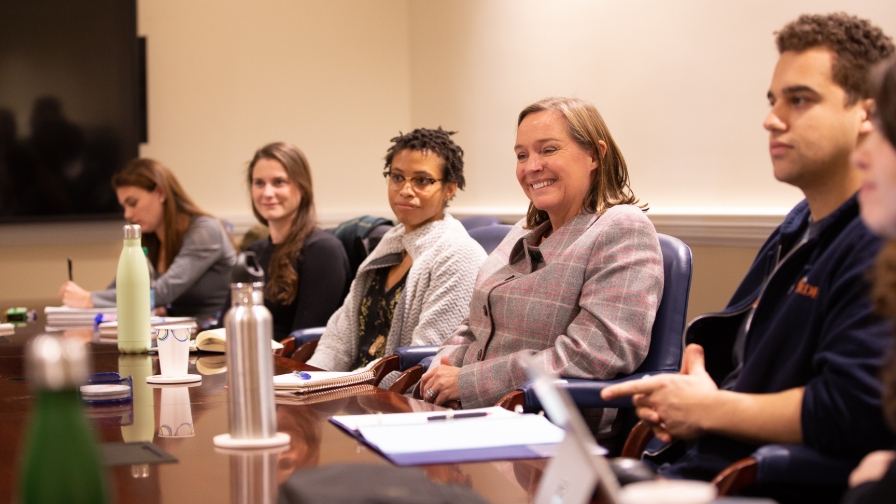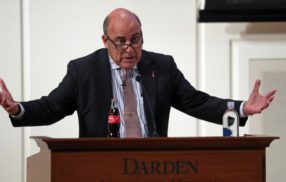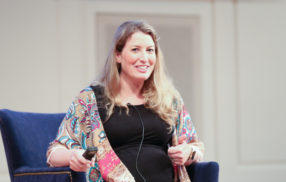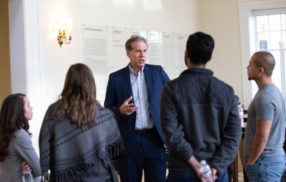
Coca-Cola VP on the Evolution of Communications, Leadership Skills of the Future, Super Bowl in Coke’s Back Yard
By Dave Hendrick
Joanna Price’s global career at The Coca-Cola Co. began in Australia and has included stints in Hong Kong, Shanghai and now Atlanta, where she serves as vice president of global communications. During a recent visit to the University of Virginia Darden School of Business, Price addressed Professor June West‘s and lecturer (and former Coca-Cola executive) Steve Soltis’ “Leadership Communication During Times of Disruption and Transformation” class, met with students including the Net Impact club, and spoke with The Darden Report about effective communication in a time of data overload, starting a global career and the Super Bowl. An edited transcript of the conversation follows.
Q. You have spent your career in communications, including 15 years at a high level at The Coca-Cola Co. How have you seen the function evolve?
A. It’s interesting because we’ve got more data now than we’ve ever had, so we are able to get a lot more information about who should be seeing our messages and what they do with our messages. When I first came into communications, you’d run an article on traditional media, and you weren’t able to get any feedback as to how people felt about it. Did it change their point of view? Did they share it with anyone? Now you put something on LinkedIn, Twitter or Facebook, and you have an instant ability to see likes, shares and comments.
So there’s an instant feedback component.
Part of the problem now is there is so much data, you also have to get very clear about what data you should be focusing on. A lot of work we do is to really try and understand who are the audiences that we should be talking to, and also being really clear that that it could be a different audience than who brand marketing talks to. We are often talking to policy makers, NGOs, and business and community leaders. They are the influential consumers.
So we try to understand who those people are and how they behave.
Some people prefer to get all of their content on a laptop and they want a particular look and feel. Other people prefer to get it on a mobile device, and they may only want to see the headline and the photo or the first three seconds of a video. Other audiences want to share information. So when you start to look at your data and how you are being effective as a communicator, you have to understand the audience, how they are using the material and what should you be tracking in terms of impact.
Can you give an example of navigating through a crisis, and the role effective communication played in the response?
One thing I would say, particularly when you are in that situation where you have consumer complaints about an ad or a product, what people tend to do first is say, ‘What are we going to say?’ even when we don’t have all of the information.
That’s where people often trip up. They think we need to get something out straight away. When in crisis mode, if you at least go out and acknowledge that something is going on and you are looking into it, you buy yourself time.
Now, you have to come back within a fairly quick period of time with the actions you are taking, but I think people are too quick to say, ‘There is no problem. We have it under control.’
I’ve had experiences with crises where we’ve said we’re looking into it, but then, as the communicator, I haven’t asked enough different questions of enough different people to triangulate where I think the truth might be. So I have trusted that what I’m getting is the right information, and we’ve sent communications that then the next day we’ve had to reconsider.
So the lesson for me is: Don’t just jump straight to communications, but the other one is you need to ask a lot of questions, and not just from the people you are in the room with.
One thing communicators bring to the room is that external perspective. Don’t ever lose that gut. You need to keep the lens of: If I read this as a consumer, what do I take out of it?
What advice do you have for the Darden MBA student aspiring to a global career and a leadership position?
The traditional hierarchical model where people came into a company as a junior brand manager, for example, and started a very linear progression has gone, because organizations are seriously flattening themselves out. I think there is still a mindset of needing to be seen to be progressing in a career through my titles, but I think what people are looking for in global leaders of the future is building up your set of experiences. You need to put yourself into situations where you feel very uncomfortable and you know you don’t have the skills, but you are in there trying to learn. Because what you want to be able to do is sit in an interview for roles, and when they are asking you a series of questions, you are drawing on a range of projects and experiences so you can really show them the breadth of your thinking, the breadth of what you’ve done and the breadth of your skills.
And, you have to go live in other places. You learn an awful lot by living in countries that are not native to you.
How does a company like The Coca-Cola Co. think about the concept of disruption?
Disruption is really important, but it’s really hard to disrupt from within in some of these really big companies. So we have teams looking not only at beverages, but distribution, e-commerce, etc. So who are the upstarts and who is doing what?
Traditionally large companies would do M&A and buy companies outright and merge them into the organization, and then nine times out of 10 that failed because they were successful under a different culture and different regime. The way we think about brand Coke is not going to work for upstart brands, for example.
We’ve got a lot of different ways we invest. We might buy something outright or we may buy a stake. One of the things our CEO has brought in is this concept of connected but not integrated. The idea being that these organizations have been very successful with their own way of doing things and their own culture. But by being connected to Coke, we give them access to scale, but they get to keep running their business.
One of the most powerful things is understanding each other’s strengths and weaknesses, but mostly the parent company understanding its strengths and weaknesses. Brand Coke is a really successful brand, and before we do anything with Coke, we put any adverting through a whole lot of hurdles. You don’t do that with a startup. You just put it out there and you test and learn when it’s in the marketplace, so that’s when you need to understand how each culture behaves differently, and leverage that but workout where you can help each other.
This weekend is the Super Bowl in Atlanta. As one of the city’s best-known corporate citizens, how do you interact with the event?
It’s an opportunity to showcase Atlanta to the world and the U.S. So, for example, we gave a grant to the Center for Civil and Human Rights near Mercedes-Benz Stadium that will allow free access to the museum so people can come in and experience a huge part of Atlanta’s history. For us, it’s about helping Atlanta showcase what an amazing city it is.
The University of Virginia Darden School of Business prepares responsible global leaders through unparalleled transformational learning experiences. Darden’s graduate degree programs (MBA, MSBA and Ph.D.) and Executive Education & Lifelong Learning programs offered by the Darden School Foundation set the stage for a lifetime of career advancement and impact. Darden’s top-ranked faculty, renowned for teaching excellence, inspires and shapes modern business leadership worldwide through research, thought leadership and business publishing. Darden has Grounds in Charlottesville, Virginia, and the Washington, D.C., area and a global community that includes 18,000 alumni in 90 countries. Darden was established in 1955 at the University of Virginia, a top public university founded by Thomas Jefferson in 1819 in Charlottesville, Virginia.
Press Contact
Molly Mitchell
Senior Associate Director, Editorial and Media Relations
Darden School of Business
University of Virginia
MitchellM@darden.virginia.edu







